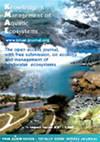Temporary turbine and reservoir level management to improve downstream migration of juvenile salmon through a hydropower complex
IF 1.7
3区 环境科学与生态学
Q3 FISHERIES
引用次数: 4
Abstract
Developing management rules to improve downstream migration of salmon smolts in large hydropower plants is essential to limit mortality and migration delay. A 2-year telemetry study was conducted to assess the efficiency of temporary measures to enhance the safety and speed of juvenile salmon passage through the Poutès dam (Allier River, France). 124 smolts were tracked through the reservoir and downstream of the dam, during implementation of turbine modulation and/or shutdown during night and reservoir level lowering. Level lowering significantly reduced median residence time from 3.4 days to 4.4 hours. However, even with high spill during turbine modulation, the risk of smolt being drawn toward the turbines was increased at low reservoir level due to the site's configuration, greater proximity to the surface and weak repulsive effect of the rack. Moreover, results revealed that a substantial proportion of smolts can migrate during daytime and twilight during floods, even at the beginning of the migration period. Thus targeted turbine shutdown has a good potential to protect smolts, but implementation requires studies taking account of site specificities and a flexible approach.临时水轮机和水库水位管理,通过水电综合体改善鲑鱼幼鱼的下游迁移
制定管理规则以改善大型水电站中鲑鱼幼崽的下游迁移,对于限制死亡率和迁移延迟至关重要。进行了一项为期2年的遥测研究,以评估临时措施的效率,以提高幼年鲑鱼通过pout大坝(法国阿列河)的安全性和速度。在实施涡轮机调节和/或夜间关闭和水库水位降低期间,跟踪124只小鳟鱼穿过水库和大坝下游。水平降低显著减少了中位停留时间,从3.4天减少到4.4小时。然而,即使在涡轮机调节期间有高泄漏,由于场地的配置,更接近表面和机架的弱排斥效应,在低水库水位时,smolt被吸引到涡轮机的风险也增加了。此外,研究结果显示,相当一部分幼鱼可以在洪水期间的白天和黄昏进行迁徙,甚至在迁徙期的开始。因此,有针对性的涡轮机关闭有很好的潜力来保护幼鱼,但实施需要考虑到现场的特殊性和灵活的方法。
本文章由计算机程序翻译,如有差异,请以英文原文为准。
求助全文
约1分钟内获得全文
求助全文
来源期刊

Knowledge and Management of Aquatic Ecosystems
环境科学-海洋与淡水生物学
CiteScore
3.70
自引率
5.60%
发文量
22
审稿时长
>12 weeks
期刊介绍:
Knowledge and Management of Aquatic Ecosystems (KMAE-Bulletin Français de la Pêche et de la Pisciculture since 1928) serves as a foundation for scientific advice across the broad spectrum of management and conservation issues related to freshwater ecosystems.
The journal publishes articles, short communications, reviews, comments and replies that contribute to a scientific understanding of freshwater ecosystems and the impact of human activities upon these systems. Its scope includes economic, social, and public administration studies, in so far as they are directly concerned with the management of freshwater ecosystems (e.g. European Water Framework Directive, USA Clean Water Act, Canadian Water Quality Guidelines, …) and prove of general interest to freshwater specialists. Papers on insular freshwater ecosystems and on transitional waters are welcome. KMAE is not a preferred journal for taxonomical, physiological, biological, toxicological studies, unless a clear link to ecological aspects can be established. Articles with a very descriptive content can be accepted if they are part of a broader ecological context.
 求助内容:
求助内容: 应助结果提醒方式:
应助结果提醒方式:


